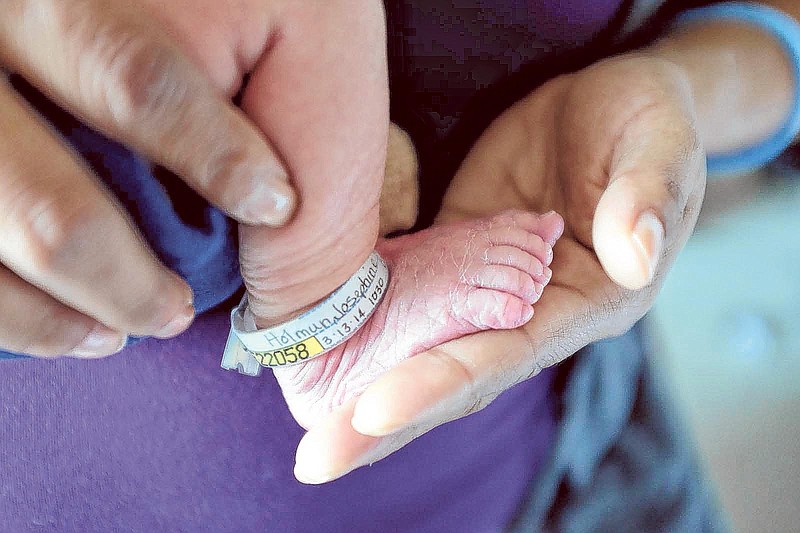For new parents still at the hospital, it can be painful to watch a nurse come into their room with a needle and prick their infant's tiny heel.
Once the nurse collects a few drops of blood on a piece of filter paper, however, parents quickly forget about the ordeal.
But the hospitals know just how crucial those few drops can be. They are a map for laboratories to test for two dozen conditions that include genetic diseases like cystic fibrosis and sickle-cell anemia.
Without such tests -- and without fast turnaround times for results -- some disorders can cause disability or even death within an infant's first few weeks. One in 800 babies is born with such conditions.
"With some of these conditions we screen for, it is crucial to diagnose and start treating these babies within a few days," said Dr. Michael Warren, director of maternal and child health for the Tennessee Department of Health, who said about 80,000 babies are born and tested in the state each year.
That's why state guidelines say hospitals should get the specimens in less than two days after the sample is taken.
But only a small fraction of local hospitals achieve that time frame, new data released by the state shows.
In January, 7 percent of specimens from Parkridge East Hospital made it within the two-day window, while 2 percent from Erlanger's downtown campus and 0.5 percent from Erlanger East met the guideline. At SkyRidge Medical Center in Cleveland, Tenn., 38.3 percent of newborn samples made the deadline. CHI Memorial in Chattanooga does not offer labor and delivery services.
Statewide, just 16.7 percent of hospitals hit the target. Forty-one percent take between four and nine days. The data does not specify the typical time it takes for individual hospitals to have their specimens delivered; it just shows how often they reach the target.
The Chattanooga-area hospitals -- along with most hospitals in the state -- score high marks when it comes to taking the tests accurately and collecting the blood test within the required 24-48 hour window after birth. The delay is getting the blood to the lab.
About 78 percent of samples reach the lab in under four days -- a frame that Warren described as "pretty timely." But the figures could be better, he said.
It's unclear whether delays are in initial shipping or in transport. Hospitals have inconsistent shipping methods: Some use the U.S. Postal Service to deliver the tests, while others opt for FedEx and UPS.
To get nearer the time frame, the state last week deployed a new courier service that will pick up and shuttle hospitals' newborn screening specimens on a quicker, more consistent schedule.
Such a service is considered best practice in other states. Georgia, for example, requires couriers or express mail to transfer specimens.
The courier service, contracted through the national company Medical Logistical Solutions, launched in East Tennessee this month, and will start elsewhere in the state in coming weeks. Parkridge East has already signed on to use the service, hospital officials said Friday.
"Parkridge takes the health and well-being of newborns very seriously," said Ronnie Hall, associate chief nursing officer at Parkridge East. "That's why we exceed the state average for conducting infant blood disease tests on time, and conducting them correctly."
Erlanger officials could not be reached for comment Friday, but in previous interviews hospital officials said most tests are typically shipped the day after they are taken, unless it is a weekend. If the staff is worried about something while the baby is still in the hospital, they may order an in-house test in addition to what they send to the state lab.
The courier service is just one of a series of changes Tennessee health officials have enacted over the last two years to improve the newborn screenings program.
Other states also have re-examined their practices after an investigative report by the Milwaukee Journal-Sentinel revealed widespread delays in newborn screenings and their devastating impacts on some children.
At the time, Tennessee was one of 14 states that did not make public transit times for the screenings. The state also had limited lab hours for processing the tests.
Since then, however, Tennessee has begun posting transit times and breaking down performance by hospital. The lab is now open six days instead of five, to avoid backlogs.
Warren hopes the courier service will turn Tennessee into a model for newborn screening promptness. Already, Tennessee is one of six states nationally asked to participate in a national quality improvement project focused on timeliness of screenings.
During the course of the project, other states asked to duplicate Tennessee's monthly report, Warren said. But more important, he said, is that the new system allows hospitals to improve their screening processes.
"We can generate these reports all day long, but if they're not helping the hospitals, they do no good," Warren said.
Contact staff writer Kate Belz at kbelz@timesfreepress.com or 423-757-6673.
